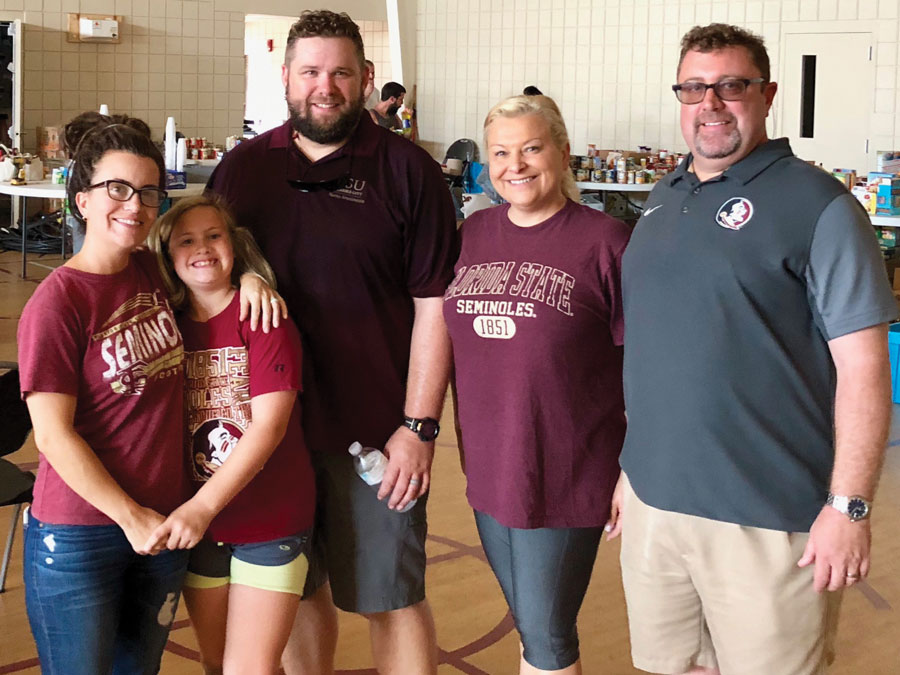 Stacey Van Dyke, DNP, CRNA is the Program Administrator for the Master of Science in Nurse Anesthesia program at Florida State Panama City.
Stacey Van Dyke, DNP, CRNA is the Program Administrator for the Master of Science in Nurse Anesthesia program at Florida State Panama City.
When I became program administrator for the Master of Science in Nurse Anesthesia program at Florida State University Panama City in 2016, I knew my military background as a U.S. Air Force lieutenant colonel and my educational background as a Doctor of Nursing Practice graduate of the UAB School of Nursing had well-prepared me for the role. I had no idea, at the time, that my experience as a Hurricane Katrina survivor would also provide invaluable lessons in leadership development.
I was an anesthesia student in 2005 and lost my home to Hurricane Katrina. Of all the nurse anesthesia program directors to handle a hurricane and its aftermath with their students, I was the program director when Hurricane Michael hit Panama City, FL October 10, 2018.
The day Hurricane Michael hit, I was traveling back to Panama City from California. Before I boarded the plane, a gate attendant announced a flight change — anyone flying into Panama City Beach would get off the plane in Nashville instead. From Nashville, I drove to Birmingham. My assistant program director, also a Veteran, already evacuated and was in Birmingham. Together we started making contingency plans for students to continue their education before the storm even made landfall. Being able to tap into the leadership skills I learned in the DNP Program was an invaluable asset as I began reaching out to colleagues. Our military training also kicked in. Keeping safety a priority, we initiated our recall, making sure to contact every single student to the degree that we could. This became more difficult after the hurricane hit, but we didn’t stop until we were positive that every student was safe.
As we planned for Michael, I remembered how terrified I was in the aftermath of Katrina. With only a year left until graduation, I suddenly had no home and had to move with my child, with nothing more than an air mattress, to finish my program. Fortunately, with lots of encouragement and reassurance from my faculty, I graduated. I even won the Agatha Hodgins Award for Outstanding Nurse Anesthesia Graduate. As a program director, I knew my role was now to encourage and reassure.
I drew on not only the wealth of education and leadership experiences the UAB DNP Program provided me but also experiences I had as a student. My main focus had to be making sure my students received the support they needed to alleviate as much of their stress as possible. We found financial support for them, reassured them that everything would be OK and stayed in constant contact.
Many students who lived close to the coast had no supplies — no food, water or gas. The whole area was a disaster. However, students who lived further north helped out. They brought trailers of supplies to help other students, faculty and others in need. They also tarped roofs, provided medical care for power line workers and conducted blood pressure checks. They did whatever they could to help. They were heroes. They were nurse leaders.
With basic needs met, our focus shifted to the group of seniors who were supposed to graduate in two months. Their clinical sites were damaged, and we had to act quickly to find facilities where they could complete their clinical requirements for graduation. One senior lost everything just like I did in Hurricane Katrina, but three days after Michael hit, she moved to Jacksonville and completed her clinicals. Our other seniors were dispersed wherever there was a spot, and I am proud to say that every single one finished on time! I have never met a more resilient group of students.
This herculean effort would have been impossible without the support we received from nurse anesthetists across the country, including UAB. Dr. Susan McMullan graciously agreed to amend her clinical schedule with a shared clinical site to accommodate the influx of students. Many of our students also applied for scholarships through the American Association of Nurse Anesthetists Foundation and were able to get the help they needed. Impressively, none of our students dropped out despite the setbacks created by the hurricane. No one quit, no one gave up, no one didn’t find a way — they just pressed on. This year, our program has seen a record number of applications, with many applicants stating how impressed they were by our ability to overcome a Category 5 hurricane and take care of our students.
Until October 10, 2018, I only credited my military background and UAB education for preparing me as a nurse anesthesia program director. I never gave Hurricane Katrina credit. Now, I have a new appreciation for that experience and hope my students will be able to appreciate Hurricane Michael’s impact on their leadership development.